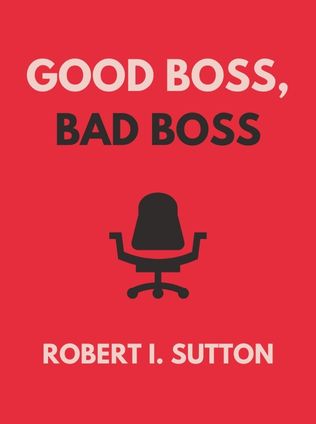
Good Boss, Bad Boss
How to Be the Best... and Learn from the Worst
By Robert I. Sutton
Published 11/2017
About the Author
Robert I. Sutton, Ph.D., is a professor of management science and engineering at Stanford University. He has authored several influential books, including Weird Ideas That Work, Hard Facts, Dangerous Half-Truths, and Total Nonsense, and The Knowing-Doing Gap. Sutton's work focuses on evidence-based management and the nuances of effective leadership. In Good Boss, Bad Boss, he combines real-life case studies and behavioral science research to provide insights into what distinguishes great bosses from poor ones.
Main Idea
Good Boss, Bad Boss: How to Be the Best... and Learn from the Worst by Robert I. Sutton delves into the behaviors and practices that define effective leadership. Sutton emphasizes that being a good boss involves a relentless commitment to both performance and humanity. The book provides a detailed analysis of the daily actions, attitudes, and decisions that set great bosses apart from those who are merely average or outright ineffective.
Table of Contents
- Introduction
- Setting the Stage
- What the Best Bosses Do
- Strive to Be Wise
- Stars and Rotten Apples
- Link Talk and Action
- Serve as a Human Shield
- Don't Shirk the Dirty Work
- Squelch Your Inner Bosshole
- The Upshot
Introduction
Sutton introduces the book by highlighting the significant impact bosses have on their employees' lives. He points out that while many bosses are good, the prevalence of bad bosses is substantial and can lead to severe consequences for organizations. The introduction sets the stage for understanding the crucial role of bosses in influencing workplace dynamics and overall employee well-being.
"The best bosses succeed because they keep chipping away at a huge pile of dull, interesting, rewarding, trivial, frustrating, and often ridiculous chores." - Robert I. Sutton
Setting the Stage
Sutton emphasizes that bosses matter because most employees have bosses, are bosses, or play both roles. The success or failure of a boss hinges on how well they navigate relationships with their immediate followers. He presents the story of Corey Billington at Hewlett-Packard (HP) to illustrate the difference a good boss can make.
Corey joined HP's SPaM group, which struggled under its previous leader, Hector. Hector's erratic and disengaged leadership style demoralized the team. When Corey took over, he focused on understanding his team, aligning projects with their skills and interests, and advocating for fair compensation. Within five years, Corey's leadership transformed SPaM into a high-performing group recognized for its excellence.
"People do not quit organizations; they quit bad bosses." - Robert Hogan
the importance of good bosses include:
- Creating a supportive work environment where employees feel valued.
- Helping employees develop their skills and grow within the organization.
- Ensuring fair compensation and recognition for contributions.
What the Best Bosses Do
Sutton outlines the behaviors and attitudes that characterize the best bosses. Effective bosses understand the balance between confidence and humility, recognizing their limitations while confidently leading their teams. They also create an environment where employees feel safe to share their ideas and feedback.
"The best bosses work relentlessly toward two general kinds of goals: performance and humanity." - Robert I. Sutton
Key practices of the best bosses include:
- Talking more than others but not dominating conversations.
- Using positive self-talk to maintain confidence and motivation.
- Showing occasional flashes of anger to assert control, but not being perpetually angry.
- Standing up during meetings to assert authority when needed.
effective boss behaviors:
Sign up for FREE and get access to 1,400+ books summaries.
You May Also Like
The Subtle Art of Not Giving a F*ck
A Counterintuitive Approach to Living a Good Life
By Mark MansonRich Dad Poor Dad
What the Rich Teach Their Kids About Money - That the Poor and Middle Class Do Not!
By Robert T. KiyosakiHow To Win Friends and Influence People
The All-Time Classic Manual Of People Skills
By Dale CarnegieQuiet: The Power of Introverts
The Power of Introverts in a World That Can't Stop Talking
By Susan Cain



















